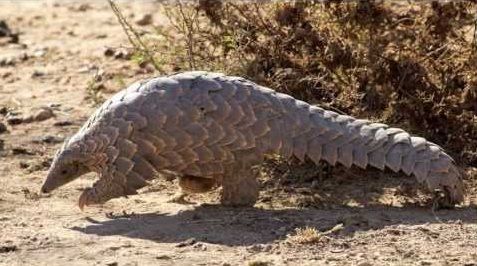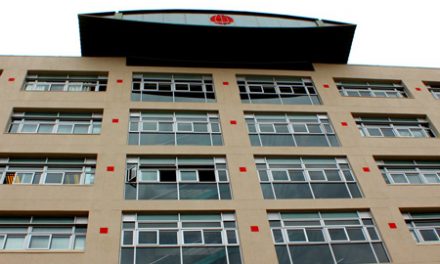
African Ietermagog goes to China by the tonnes-load

PRNewswire – A critically endangered Namibian mammal is receiving international attention with the release this week of an investigative report detailing the ongoing large-scale trafficking in this group of species.
The eight species of pangolins or scaly anteaters are found across Africa, the middle East and South Asia. All eight species are widely pouched for their scales, believed by superstitious Orientals to have medicinal value. In fact, the scales are just compressed hair meaning they consist of keratin.
In the run-up to a special commemorative day for pangolins, the Wildlife Justice Commission released its report “Scaling Up: The Rapid Growth in the Trafficking of Pangolin Scales (2016-2019)” earlier this week. The report highlights that this large-scale trafficking, which is driving the species to the brink of extinction, must be addressed as a transnational organised crime and that law enforcement must use advanced investigative techniques to stop the crime.
The report combines the analysis of reported seizure data between 1 January 2016 and 31 December 2019 and the commission’s own investigation to build a comprehensive understanding of the criminal dynamics and trends on the transnational trafficking of pangolin scales.
The analysis puts the spotlight on the trafficking to identify prolific countries (including the disproportional involvement of Nigeria and Vietnam), smuggling routes, shipping methods and the street value of pangolin scales. The analysis shows a significant and rapid increase in the volume being trafficked, facilitated by organised criminal networks.

Pangolin scales being weighed. Photo shared by traders with WJC investigators. December 2019.
An estimated 206.4 tonnes of smuggled pangolin scales were confiscated from 2016 to 2019 from 52 seizures. Analysis of the seizure data shows an increase in trafficking at unprecedented levels: nearly two-thirds of the tonnage seized (132.1 tonnes) were detected in the last two years (2018-2019). In 2019, the average weight of a single pangolin scale shipment was 6.2 tonnes, compared to 2.2 tonnes three years earlier.
“We believe that these figures are only a fraction of the total, as it is likely that a significant proportion of smuggling passes undetected,” said Sarah Stoner, the World Justice Commission’s Director of Intelligence. “Our investigative approach adds an additional dimension in quantifying the scale of trafficking due to our intelligence concerning the stockpiling of pangolin scales (over 16 tonnes over three years) in Vietnam alone, which is in addition to the detected seizures we have analysed.”
The analysis also examines the relationship between ivory and pangolin scales trafficking and what this means in a crime context. Due to the decrease in the value of ivory, organised criminal networks have switched commodity types and are having to move huge shipments of scales to maintain profit margins. But the commission said Pangolin scales are worth less per kg than ivory.
“Organised crime in wildlife is not species specific: it is about high-value commodities and profits. Networks will shift to a different species if the margins are good. In order to effectively tackle it, organised wildlife crime must be tackled from a criminal perspective, as well as from its transnational dimension, rather than solely focusing on it at a national level,” said Stoner.
“The recent year-long investigation in China into the trafficking of pangolin scales and the more recent seizure by Nigerian authorities are great examples of how these transnational wildlife crimes should be investigated and the tangible results it can achieve in disrupting organised crime. Without this approach, pangolins remain in an incredibly vulnerable position that is threatening their existence,” said Stoner.
The full report can be found at the World Justice Commission website, www.wildlifejustice.org.












































